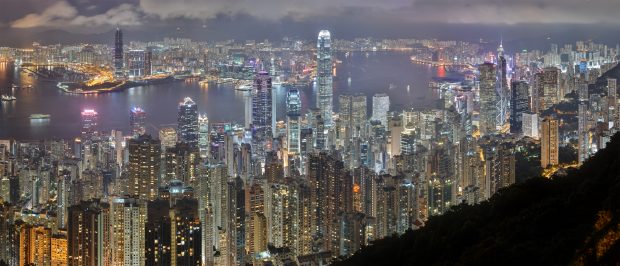
Hong Kong clash with destiny

By Ivan Lim
Contributor to AsiaN
Singapore:
Singapore: A divisive Hong Kong has settled into an uneasy calm following last Sunday’s district-level elections. The momentum from close to six months of street protests marked by clashes with riot-police helped the pro-democracy camp outpolled their pro-establishment rivals in a historic shift in six such elections.
The strong showing at the polls by the democratic parties may or may not pave the way for electoral contestation instead of street struggles to resolve the long-standing social problems and concerns over China’s interference in the semi-autonomous city’s political system.
There is now hope for dialogue and consultation too as the Chief Executive Carrie Lam has openly acknowledged that the poll’s outcome “reflected the people’s dissatisfaction with the current situation and deep-seated problems in society”. Her administration would have to address those issues and concerns, if there is going to be reconciliation between the opposing sides.
Carrie Lam must seize the moment to reach out to the restive youths and students spearheading the protests that was sparked by the tabling, without proper consultation, of the Extradition Bill in June, further fanning fury over China’s creeping encroachments into the city’s rule of law. Already, the pro-democracy lobbies are showing anger at the perceived slow government response to their five demands and calling for new rallies to pressure the government.
However, Carrie Lam and her administration would not want to be seen as weak leader who bows to the demands that included withdrawal of the Extradition Bill, an independent inquiry into police use of force and universal suffrage.
No Iron Lady nor easy pushover, she clearly has to prioritise the pressing issues to act on, such as the clean-up and restoration of damaged and vandalised public facilities during violent demonstrations –for which the radical protesters had yet to be held accountable and in which the voters had apparently discounted in the prevailing democratic wave sweeping the former British colony.
Her immediate task is to restore confidence in the health of the Hong Kong economy which had taken a bashing from the service and business disruptions caused by the social and political unrest. On Friday, she was in Bangkok for bilateral trade talks with Deputy Thai Prime Minister Somkid Jatusripitak.
Carrie Lam held out an olive branch to her detractors when she told a press conference that Hong Kong’s fundamentals, including “our unique strengths under ‘one country, two systems’ our rule of law and independent judiciary remains strong”.
“I and my government are listening to our people, with a view to resolving some deep-seated problems…through dialogue.”
A popular Chinese saying has it that “It takes a fight for two parties to know each other better”.There need to be some give-and-take for Hong Kong to return to normalcy.3/…
Behind the bitter civil strife that has brought Hong Kong to the edge of the cliff is intransigence —the hard-line all-or-nothing demands of hotheaded and impatient young activists frustrated by a seemingly unresponsive proxy of China.
Compromise seems the sensible way to break the logjam.
Yet the big win by pan-democracy parties in the district council polls plus United States backing against China’s interference through its Democracy and Human Rights Act have strengthened the hand of those seeking to confront the establishment on its back foot.
Ironically, the democrats given the mandate to run the district councils have to help clean up the mess wrought by mass protests.
Secondly, any sanctions imposed by the US under the Act for China’s encroachments, such as removing trade privileges, would hurt Hong Kongand its people.
It is incumbent on elected officials to beat swords into ploughshare and engage with the authorities to deal with Hongkongers’ livelihood and welfare problems such as critical lack of affordable housing. The first Chief Executive Tung Chee Wahis said to have looked at the Singapore model in his early efforts to tackle the housing shortage.
In the eyes of the republic’s late first Prime Minister Lee Kuan Yew, home-ownership has given citizens a stake in the nation’s stability and prosperity. In return for their economic well-being and security interests, freedom-loving Singaporeans are, by and large, willing to concede to draconian political laws. Not that a new generation of citizens might not seek to loosen things up a bit.
It is noteworthy that as two sister cities that had 200 and 150 years of British colonial tutelage respectively,. Singapore and Hong Kong post such a stark contrast in how their citizens choose to make their different pacts with destiny.
Amid the politics of confrontation in Hong Kong, a pro-establishment restaurant owner visited the Lion City and quickly learned how different it is from his own city. On October 11, the patriotic businessman gathered a group of friends and other to air their views on the pro-democracy protest movements in their financial hub.
He was called in for questioning by the police for holding an illegal public meeting under the Public Order Act. In his case, he was told, the police would not issue a permit for public assemblies to advance political causes in other countries.
Alex was ordered to leave Singapore. At Changi Airport, he sent out a video post in which he commended Singapore for its law and order. He also made a pitch for pro-establishment candidates taking part in the district council elections, urging the older generation to vote for peace and order in Hong Kong.
Alex was disappointed when the pan-democrats swept the polls, taking control of 17 of the 18 district councils, but that is the way the political game of confrontation is currently playing out.


